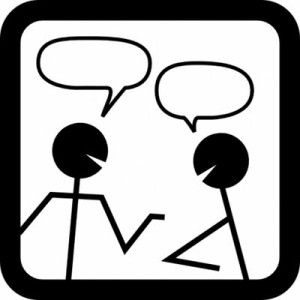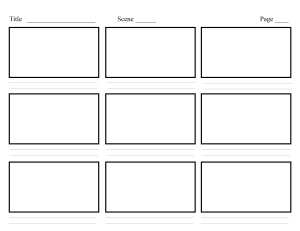
We all have our strengths and weaknesses when it comes to writing. Me? I’m tend to be a little skimpy on describing the scenes and the characters. But I think I’m pretty darned good at dialogue. Other writers may not be so good at it. Perhaps the conversations between their characters seem too contrived. Or perhaps the characters come across as too stiff and formal. Or every character sounds the same. So here are some tips to help improve dialogue.
Get in the Characters’ Heads
-Motives
Each of your characters has a different motive. So what they say is generally going to be motivated by what they want. For example, say Jack really likes this girl, but his friend Kevin happens to know the girl isn’t really into him. So while Jack is busy talking about how great this girl is, Kevin will try to find a way to hint about the girl without hurting Jack’s feelings. Perhaps he will start out by pointing out all her flaws.
-History/Background
Another way to get into the characters’ heads is to remember they all have different backgrounds, different beliefs, different occupations, and so on. This is going to affect how they speak. Someone from the country may be more inclined to use slang. A doctor will be most likely to use correct medical terminology and medical jargon. Someone who is religious might go around blessing and praying for everyone or by often attributing things to God’s will.
-Personality
The different personalities of each character will also need to be considered. If Steve is self-absorbed, he might not care about why Sally is crying and so he’s either going to ask half-heartedly or not at all, depending on their relationship. If Joe tends to keep to himself, he’s not going to say too much in a conversation and to have him suddenly spill his heart out will not make any sense.
Grammatically Incorrect
People don’t always speak in a grammatically correct way. They might use slang or improper words like ain’t, y’all or irregardless. They might use a lot of filler words like um, yeah, well. They might use gone instead of went like, “She’s gone to the store” instead of “She went to the store.” They might use me when they should use I or I when they should use me like, “him and I” or “him and me”. They might end the sentence with a preposition, such as, “Where you at?” instead of “Where are you?” they might say should of instead of should have. The list goes on and on. And for the sake of readers, it will help if each of your characters has a different quirk. One way to get an idea for all the different ways people speak is to listen.
Be Clear About Who is Speaking
Be clear about who is speaking, but not by overusing names or by overusing tags. By overusing names, I mean by one character saying the name of the other character over and over. For example:
“Hello, John. Good to see you.”
“Hello, Fred. Good to see you too.”
“So, John. How’s your family?”
“Great, Fred. Blah, blah, blah.”
“That’s great to hear, John.”
You see what I’m getting at. By overusing creative tags, I mean by always adding John said or Fred said. Some people get around this by using creative tags like John coaxed or Fred persuaded. This can get a little annoying for some readers. That John coaxed or Fred persuaded should be obvious by what they said and the way they said it, not by the use of a creative tag. Don’t get me wrong. Creative tags have their place. There will be times when you will want to say John whispered or Fred mumbled. But use these creative tags very sparingly and not just as a way to use something other than said or replied.
A great way to give an idea of who is speaking without the use of tags is with action. For example, consider the above conversation modified with actions:
Fred eagerly put out his hand and grinned widely. “Hey, John. So good to see you.”
John’s eyes lit up. “Hey! Great to see you too.” He grasped Fred’s hand and shook firmly.
Fred clapped him on the shoulder. “Gosh. It’s been forever. So how’s the fam?”
“Great.” John’s brows went up. “Can you believe Ashley got into Berkley?”
“Wow! That’s great to hear.”
Action is a great way to add more feeling into the conversation. But one can overdo it on the action as well, so mix it up. Use said or replied when needed since readers find these tags less annoying. Use an occasional creative tag only where appropriate. Use action. Or, as you may have noticed in the last sentence of the conversation, use nothing. There are only two people speaking so there is no need always specify who said what. Another way you can get away with not indicating who is speaking is if your character has a unique voice. As stated in another article I wrote, there is no need to say Yoda said because everyone knows Yoda by the way he speaks.
The Conversation Has a Purpose
I can’t tell you how many times I planned for a conversation to go one way, but ended up having it go another. If you force the conversation, it sounds contrived. But if you let it flow naturally, you might end up going off on a tangent. What you need is to find a way to get the conversation to flow naturally so it goes where you want it to go. It’s not as easy as it sounds.
Even though people in real life conversations have a tendency to veer off topic or quickly change the subject, try not to do this in your dialogue. Every conversation should have a purpose, whether it’s to convey information, to get an idea of the characters’ points of view, or to establish tension between two characters. For example, my sci-fi story is about the relationship between two enemies. So there is no reason to have a chapter where one of these two characters has a conversation with a third character about knitting. This is an extreme example, but you see what I’m getting at.
If you feel two characters need to have a long conversation before they get to the primary purpose of the conversation, see if you can find a way to slim it down or skim over to the good part. Although it is better to show than tell, sometimes it is acceptable to simply tell by stating they talked about this and that for a good hour while having tea or something.
Pauses, Hesitations, Interruptions
I have a bad habit of interrupting people and I’m not the only one. People interrupt other people all the time. Then there are those people who like to take the time and think about what they’re going to say before they say it. And there are people who hem and haw with filler words before they finally get to the point. Some people talk a lot with almost no pause for breath while the other party simply shrugs their shoulders and interjects a few uh-huhs and such.
Change of Subject is Purposeful and Explainable
Don’t let your characters simply change the subject without a good reason. Changing the subject without some sort of explanation can be very jarring for the reader and can make the conversation seem contrived.
Characters Lie
Have you ever asked someone of they’re feeling okay and they say yes even though it’s obvious they’re not? Have you ever spoken to someone who told you one thing but did another? Or a person who is nice to your face but gossips about you behind your back? People are not always truthful when they speak. You can make the lie obvious or not-so obvious, depending on your purpose. Just keep your purpose in mind. Let’s use the dialogue above and change it to show what I mean.
Fred eagerly put out his hand and grinned widely. “Hey, John. So good to see you.”
John’s eyes lit up. “Hey! Great to see you too.” He grasped Fred’s hand and shook firmly.
Fred clapped him on the shoulder. “Gosh. It’s been forever. So how’s the fam?”
John’s face fell. “Great.”
“Yeah?”
John shrugged. “Yeah. Just fine.”
John’s body language indicates things are not so fine but he doesn’t want to talk about it. Fred can be oblivious or he can pick up on it, depending on his personality, and you can reflect this in the continuing dialogue.
Conclusion
Remember, all things in moderation. Don’t have characters interrupt people all the time. If your character has a tendency to speak incorrectly, don’t force it so that every single sentence is wrong. If your character uses filler words like um, don’t interject the filler words every single time they speak. The overuse of anything can easily turn into an annoyance. Balance is the key. Balance your actions and tags as well.
These are just a few tips to help with dialogue. If you can think of some more, please feel free to comment below.


















